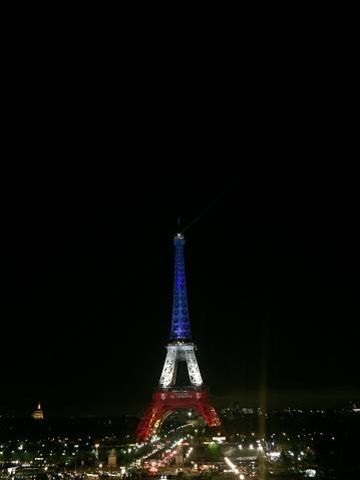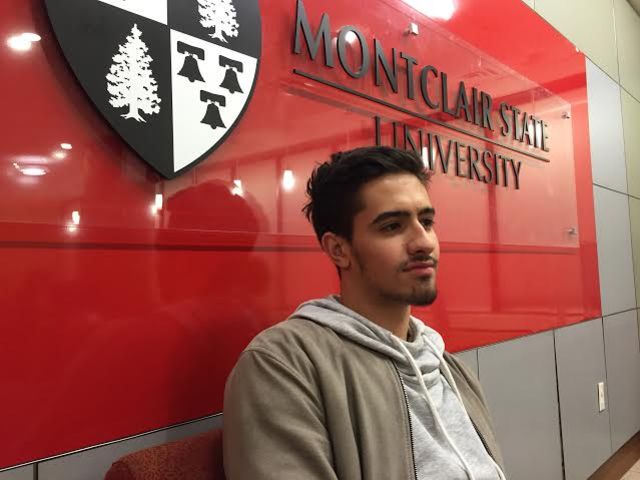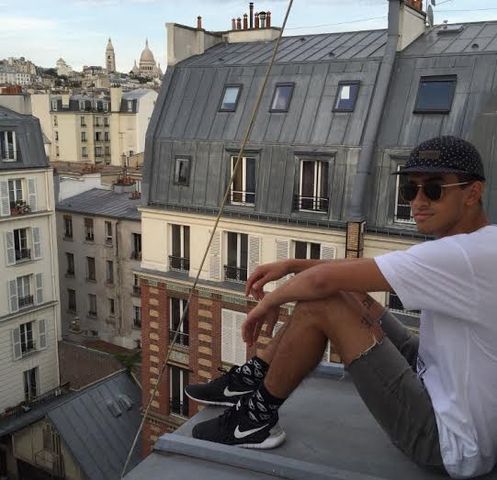At 6 years old, Ryan Fleischer was unexpectedly pulled out of his first grade math class after hearing news of the hijacked planes crashing into the Twin Towers in New York City on Sept. 11, 2001. That day, he sat outside of his home in Brooklyn Heights, watching from across the bay as the World Trade Center crumbled. Vivid scenes of scattered debris and toppling buildings are a memory that will forever be etched in the archives of his mind.
“At that time, I was very distraught about it, but growing up in a post-9/11 world, I just see that anything like that is possible,” Fleischer explained with a calmness that had obviously developed in the years that have elapsed since that day. “There’s evil out there that’s possible, and it’s in our best favor to be very vigilant and think about what we do and who we speak to.”
Nearly 15 years later, Fleischer, a senior humanities major at Montclair State University, found himself watching the France versus Germany soccer match while digesting a steak burrito at his hairdresser’s apartment in the ninth arrondissement de Paris, just minutes before suicide bombers approached the Stade de France as part of a string of terrorist attacks on Friday, Nov. 13, 2015.
“I got home, and it was just like emails, text messages, phone calls—‘Are you ok?’ ‘Is everything alright?’ ‘I need to hear from you,’ ‘Please call back,’” Fleischer said, explaining that the concern from his friends and family back home was much greater than his own. “[Calls] number one and number two were my mom and my grandma,” Fleischer said. “My grandma was distraught because I didn’t answer her phone call. I had gotten a voice mail from her completely balling out.”
That Friday had been an average day for Fleischer, who was studying in Paris through the Cultural Experience Abroad (CEA) program for the fall semester. It was his day off from classes, and he had spent the afternoon at Palais de Tokyo, a contemporary art museum in Paris. After dinner with a friend at a Mexican restaurant and a haircut, he headed back to his studio club apartment near Barbes Rochechouart, just miles from the places attacked in an area he called “the ghetto of Paris.” His plans for that evening were upset once his phone connected to the apartment’s Wi-Fi and he received the onslaught of concerned messages from back home.

A photo of the Eiffel Tower taken by Ryan Fleischer during
his study abroad trip to Paris.
Photo courtesy of Ryan Fleischer
Among the messages was one from Domenica Dominguez, the Director of Study Abroad and International Relations at Montclair State. “The students and my office received updates from CEA and ISA [International Studies Abroad] — the providers of the programs in Paris, with offices in Paris — regularly since Friday with information about the attacks, safety in Paris, instructions for students and additional links for resources and information, including how to reach the U.S. Embassy,” she said.
Fleischer found the message from Montclair State humorous, smiling as he crossed his legs, stating that it was “probably just procedure they had to follow.” He responded to Dominguez’s request for an update on his condition with an email that simply said, “It’s all good in the hood.”
Once President François Hollande declared a state of emergency and closed off the French borders, stores and businesses began to close and residents were on lockdown in their homes. “After knowing that this was basically going to be my Friday night, I went across the street to the corner store and picked up maybe like five or six tall boys and just went back home,” he chuckled as he explained that he had caught the store owner just before he closed up shop. “I drank myself to sleep,” he laughed as he recalled the snapchat he posted of himself holding a Heineken. “I remember being up until like 1 or 2 [a.m.] just constantly checking [the news as] the body count just kept going up and up,” Fleischer continued in a more somber tone. “It was terrible. It seemed at one point that there was going to be no end.”
Four people were killed outside the Stade de France; 15 gunned down at the intersection of Rue Alibert and Rue Bichat; five shot and killed outside a café in the eleventh district; 19 murdered outside a restaurant on Rue de Charonne; and 89 executed during a performance at Bataclan concert hall — this was the news Fleischer woke up to on Saturday morning. He spent part of the day driving around the city on a mo-ped, drinking in the silent aftermath of the previous night’s horrors.
“We passed the Eiffel Tower. We passed the Trocadero. We passed the Notre Dame—all of those spots were completely dead,” he said, inadvertently using a morbid pun to describe the typically crowded landmarks. “I remember taking the subway that Saturday. The typical weekend, it’s packed no matter what time of day it is. There was like one or two people. I had a professor say that hasn’t happened in decades.”
Although several students left the program out of fear for their own safety after the acts of terrorism, Fleischer said that the thought never crossed his mind. “The four months I spent in Paris were easily the best four months of my life,” he said as he outlined his post-graduation plans of moving to Paris and finding a job in the city. “Paris is a very safe city. It’s not like New York City, where there are just police officers walking around. There’s actual military walking around with, like, AK-47’s.”
Aside from his visit to the memorial at Place de la République, Fleischer did not respond emotionally or philosophically to the suicide bombers and gunmen who attacked, and described them as necessary in order to prod other countries into action against ISIS and other terrorist groups. “I don’t want people that are necessarily scared to travel because of things like this to not do it. If you have the desire, you have to just be smart about it, but do what gives you passion.”




